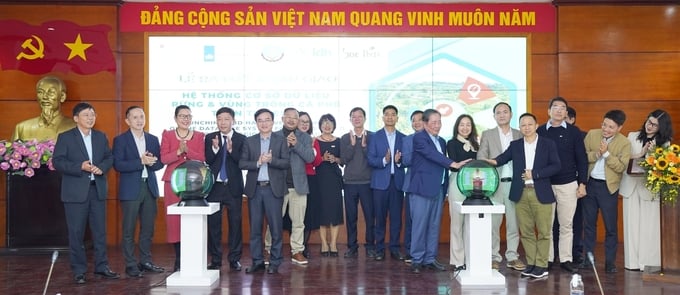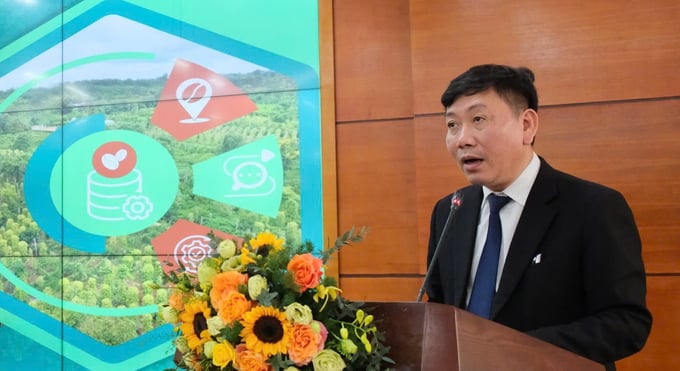June 14, 2025 | 15:21 GMT +7
June 14, 2025 | 15:21 GMT +7
Hotline: 0913.378.918
June 14, 2025 | 15:21 GMT +7
Hotline: 0913.378.918

Coffee is one of the industries affected by the EU's EUDR regulations.
On 17 December 2024, MARD and IDH (Netherlands) held the Launching and Handover of the Database system for Forest and Coffee-growing areas in compliance with the European Union’s (EU) Regulation on Deforestation-free Products (EUDR).
One of the biggest challenges facing Vietnamese coffee exporters and farmers is meeting the EU’s traceability requirements. These include ensuring that coffee products imported to the EU come from land that has not been converted from forests or caused deforestation after 31 December 2020.
In the National Action Plan for Vietnam’s Agriculture Sector to comply with EUDR, issued on 1 August 2023, MARD has outlined a clear roadmap for compliance with diverse technical support components. These are aimed at helping actors in the coffee value chain prepare for EUDR compliance while mitigating risks before the regulation is officially enforced.

Handover ceremony of the pilot results of the forest and coffee growing area database system in compliance with EUDR. Photo: Quynh Chi.
The EUDR Alliance, which is comprised of IDH, JDE Peet's, and domestic and international coffee enterprises was agreed by MARD, the Provincial People's Committees of Dak Lak and Lam Dong provinces to pilot the adaptation support activities through public-private partnership. The key steps of the pilot include: Develop a database system for forest and coffee-growing areas; Establish traceability system to track the origin of coffee products from plantation to local purchasing agents; Propose a mechanism for information sharing and feedback; Proposing support measures for farmers cultivating near forests.
From October 2023 to December 2024, IDH and the EUDR Alliance members have designed a database system that includes provincial state management data such as land use planning maps and cadastral maps, and existing production area data of coffee enterprises joining the pilot. The information then was verified through ground surveys involving enterprises, farmers, and local officials. Additional data was collected and updated for farms not yet included in cadastral maps or where information was incomplete or inaccurate. The system synchronizes, integrates, and adjusts all information to accommodate the state's maps. Enterprises are authorized to access and extract output information that meets the requirements of EUDR for the product traceability process.
The forest and coffee cultivation database system, which complies with the EUDR (EU Deforestation Regulation), is the outcome of more than a year of piloting in the Lam Dong and Dak Lak provinces, according to Ms. Tran Quynh Chi, Director of the Coffee and Palm Oil Sector at IDH. This procedure involved the collection of information and data for 130,000 hectares of forest and 136,000 hectares of coffee in the four main coffee-producing districts of Lam Dong and Dak Lak. The third province to join the initiative is Gia Lai, which is utilizing the national database system to continue the collection of data for 30,000 hectares of forest and 4,000 hectares of coffee.
According to Ms. Quynh Chi, the EU's plan to postpone the implementation of the EUDR until December 2025 will allow Vietnam to accumulate and prepare data for the remaining 600,000 hectares of coffee. Next, this database system functions as a device to broaden the data collection strategy to Vietnam's five primary coffee-producing provinces, with the potential to ultimately encompass central and northern provinces.

Mr. Nguyen Do Anh Tuan, Director of the Department of International Cooperation (Ministry of Agriculture and Rural Development) spoke at the handover ceremony. Photo: Quynh Chi.
Tracking physical products back to individual farms is required by the most recent EU regulations. This presents a substantial obstacle for businesses, as certain phases of the existing production chain remain opaque. Consequently, it is imperative to establish a transparent supply chain to satisfy EUDR requirements, evaluate risks, and create risk mitigation strategies for pertinent cultivation regions. Ms. Chi also mentioned that Vietnam can anticipate forthcoming market demands, including the Corporate Sustainability Due Diligence Directive (CSDDD) and the European Green Deal, which are anticipated to be implemented as early as 2026.
At the ceremony, the EUDR Alliance officially handed over the Database System of Forest and Coffee Production Areas to the Ministry of Agriculture and Rural Development for replicating across other coffee production regions and industries nationwide.
“The pilot implementation of this database system provides a technical solution to support the Vietnamese coffee industry in meeting the requirements of the EU Deforestation Regulation (EUDR). The Ministry of Agriculture and Rural Development will closely follow and coordinate with the local stakeholders, the coffee companies, and the international organizations to improve, expand, update and maintain this system. Thereby, the system will not only provide a solution to support the traceability and ensure the transparency in the coffee supply chains, but also create a basis for replication in other agro-industries, towards transparent, responsible and sustainable agriculture.", Mr. Nguyen Do Anh Tuan, Director of International Cooperation Department stated.
“The launch of the Database System for Forest and Coffee Growing Areas marks an important step toward EUDR compliance in Vietnam. The additional time proposed aims to ensure that industry sectors and global partners, such as Vietnam are fully prepared for the entry into application of the Regulation, facilitating a smooth and effective rollout. This opportunity should be seized to prepare, take concrete actions, and meet EUDR requirements effectively, paving the way for a sustainable future for Vietnam's coffee sector”, said Ms. Mara Grimminger, International Relations Assistant, Directorate General for the Environment, European Commission.
With a clear roadmap, strong determination, and coordinated efforts from both central and local authorities, Vietnam’s coffee industry, and the country, now have a valuable opportunity to accelerate preparatory activities. This will ensure compliance with the EU’s new regulations and contribute to promoting a transparent, responsible and sustainable agriculture.
Translated by Dieu Linh

(VAN) The working delegation from the Ministry of Agriculture and Environment conducted an important trip to the Netherlands to strengthen strategic partnerships and sustainable development in the agricultural sector.

(VAN) The letter ‘A Plea from the Ocean’ not only evokes emotion but also awakens the human conscience to the responsibility of protecting life on Earth.

(VAN) The Department of Agriculture in South Africa has announced the country’s first mass vaccination of poultry to prevent local birds from contracting avian influenza.

(VAN) Establishment of the Mekong Delta Regional Agricultural Linkage Center, aiming for a closed value chain, deep processing, trading platforms, and international market connectivity.

(VAN) Gia Lai province has recently recorded 460 rare species of animals and plants, contributing to forest conservation and biodiversity planning in the region.

(VAN) Ms. Caroline Beresford, New Zealand Ambassador to Vietnam, expressed confidence that agricultural cooperation between Vietnam and New Zealand will develop sustainably, be climate-resilient, and promote gender equality.

(VAN) Vietnam reaffirms its commitment to international cooperation in fostering sustainable and responsible fisheries while ensuring resilient livelihoods for small-scale fishing communities.